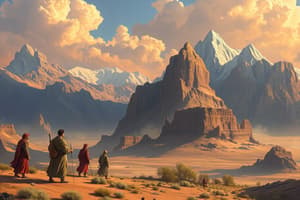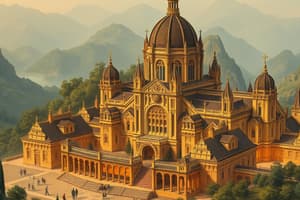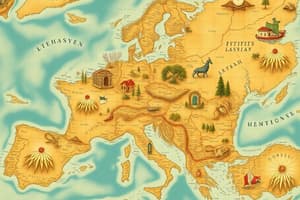Podcast
Questions and Answers
Who is credited with coining the term 'geography'?
Who is credited with coining the term 'geography'?
- Carl Ritter
- Friedrich Ratzel
- Ptolemy
- Eratosthenes of Cyrene (correct)
Which of the following statements about geographical landscapes is correct?
Which of the following statements about geographical landscapes is correct?
- Cultural landscapes are formed by soil, water, and flora.
- Natural landscapes consist of permanent elements on the Earth’s crust. (correct)
- Natural landscapes are always modified by human actions.
- Cultural landscapes remain unchanged over time.
Which branch of geography focuses primarily on human interactions and their impacts?
Which branch of geography focuses primarily on human interactions and their impacts?
- Human geography (correct)
- Physical geography
- Biological geography
- Cultural geography
Which of the following is NOT typically considered a branch of geography?
Which of the following is NOT typically considered a branch of geography?
Who is referred to as the father of modern geography?
Who is referred to as the father of modern geography?
Flashcards are hidden until you start studying
Study Notes
Definition and Origins of Geography
- Geography is a science focused on understanding Earth’s processes and features.
- The term "geography" comes from "GEO" meaning earth and "Graphos" meaning description.
- Eratosthenes of Cyrene is credited with coining the term and proving the Earth is round.
- Strabo authored "Geographica," a foundational text that introduced key geographical concepts.
- Ptolemy created maps and defined "Geographia," incorporating planetary order theories.
Historical Influences
- Marco Polo's travels in the 12th century contributed significantly to geographic knowledge in Europe.
- The modern concepts of geography emerged in the 19th century.
- Alexander Von Humboldt is often referred to as the father of modern geography.
- Carl Ritter emphasized the study of cultural, historical, and economic phenomena in geography.
- Friedrich Ratzel introduced the theory of geographical determinism, linking geography and human behavior.
Geographic Information Systems
- Geographic Information Systems (GIS) are vital tools for mapping and analyzing spatial data.
Multidisciplinary Nature
- Geography interacts with various fields such as ecology, urbanism, architecture, tourism, and history.
Branches of Geography
- Physical Geography: Studies natural features and processes of the Earth.
- Human Geography: Examines human interactions and impacts on the environment.
- Biological Geography: Focuses on the distribution of biological species across the Earth.
Geographic Phenomena
- Geographic phenomena are temporary processes occurring on Earth's surface.
- Geographic facts are the stable and permanent elements of the Earth's crust.
Landscapes
- Natural Landscape: Unaltered by human influence; shaped by soil, water, climate, and flora.
- Cultural Landscape: Altered or created by human activities; influenced by population, production, and communication patterns.
Studying That Suits You
Use AI to generate personalized quizzes and flashcards to suit your learning preferences.




